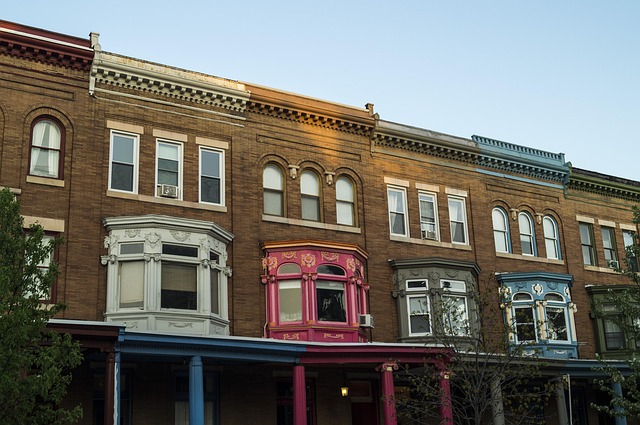Every community in America is struggling to recover from a year of COVID-19 shutdowns and could benefit from a surge in local investing. Yet only a handful of communities are prepared to embrace this strategy. An inspiring example is Market Center in Baltimore. I’m now working with the Market Center Merchants Association to embark on a bold experiment to transform this district into a beehive of local investment. And I’m pleased to invite you, dear readers, to our inaugural workshop on “The ABCs of Local Investing” this coming Thursday, February 25, 6-8 pm.
Market Center is one of 250 neighborhoods in Baltimore. It’s on the western side of downtown and is anchored by one of ten so-called ‘retail business district license area’ associations in the City. Like business improvement districts across the country, the Market Center Merchants’ Association aims to improve, beautify, and market its 27 square block territory. The big difference here is that the costs are underwritten by resident businesses, not property owners.
When the Market Center Merchants Association was set up in 1983, the district was a thriving commercial center. Then people and industry started moving out of Baltimore, and the district struggled. Many commercial buildings were vacated. Recently, however, some have been converted to residential units, and thousands of people have moved back in, many first-time residents of Baltimore, diverse in age, race, and incomes.
The current head of the Merchants Association, Kristen Mitchell, fell in love with the neighborhood when she was growing up near Baltimore. “It always had a ton of untapped potential.”
Today the district has 280 dues-paying businesses. In recent years Mitchell has organized “mingles” to introduce residents and businesses. “You never know what’s going to come of a connection like that,” she says. And she is now seeing local businesses growing more confident, and residents thinking more deeply about how to support these businesses.
Despite the pandemic, Market Center businesses have been expanding. On the 400 block of Howard Street, six buildings were renovated to provide 45 new housing units and 5 new commercial spaces. Fabulous new businesses are now moving into the ground floors—a yoga studio, a nut-based ice-cream maker, a tea bar, a vegan juice bar, a natural beauty care business. All are run by Black women.
Mitchell now wants to take the logical next step: Nudge businesses to consider raising local capital, and nudge residents to consider moving their money from Wall Street into these businesses. Enter the Maryland Neighborhood Exchange, started by myself through Neighborhood Associates and Stephanie Geller of Community Wealth Builders.
Some of you may have noticed my periodic PPS on these newsletters, encouraging people living in or near Baltimore to visit the Exchange. Our mission has been to help promising Baltimore businesses prepare for successful investment crowdfunding campaigns, and to create one place where interested local investors know where they can find “hot prospects” in Baltimore. Over the past year, our site has helped connect 20 businesses with $200,000 of local investment.
Most crowdfunding sites have incomplete marketing strategies, and rely heavily on listed businesses to convert their fans into investors. The theory of the Exchange is that if we can build a critical mass of investors in one place like Market Center, local investors in business #1 will be open to investing in businesses #2, #3, etc. Accomplishing this, of course, will require lots of on-the-ground education, of both investors and businesses.
Thanks to two recent grants we received, from the Abell Foundation and the T. Rowe Price Foundation, we are now embarking on a concerted, year-long education campaign.
As far as Mitchell is concerned, the neighborhood is filled with investment-worthy businesses. A local gaming lounge is attracting people of all ages and has become a vibrant social hub. And a popular Ethiopian restaurant is looking to expand.
At the same time, Mitchell is seeing residents ready to invest. Some have already helped local businesses through donation crowdfunding campaigns on Kickstarter and Go Fund Me. This is usually a good sign people are ready to participate in investment crowdfunding where they actually could earn a real return.
Over the coming months, we will hold a series of workshops in Market Center to mobilize businesses and investors, and help bring them together through investment. What many forget is that investment, at its root, is all about relationships. And the more we can weave these relationships, says Mitchell, “the more we get to keep our beloved businesses.”
“We want people of all incomes and backgrounds to consider investing in our businesses,” Mitchell adds. ” I assume that the more financially secure residents will buy into the concept first. But I would love to get this to a point where people without a lot of disposable income will still feel comfortable investing.”
Surely this is a more promising investment opportunity than jumping on the next GameStop craze.
If you live in or near Baltimore, you should consider attending our workshop this Thursday evening. But even if you don’t live nearby, you might attend for inspiration about developing a similar program for your own community. The workshop is free, and being virtual, you can watch while enjoying your dinner.
Even if you can’t make it, watch this space for announcements of future events. We’re just getting started.
Image by Bruce Emmerling from Pixabay

